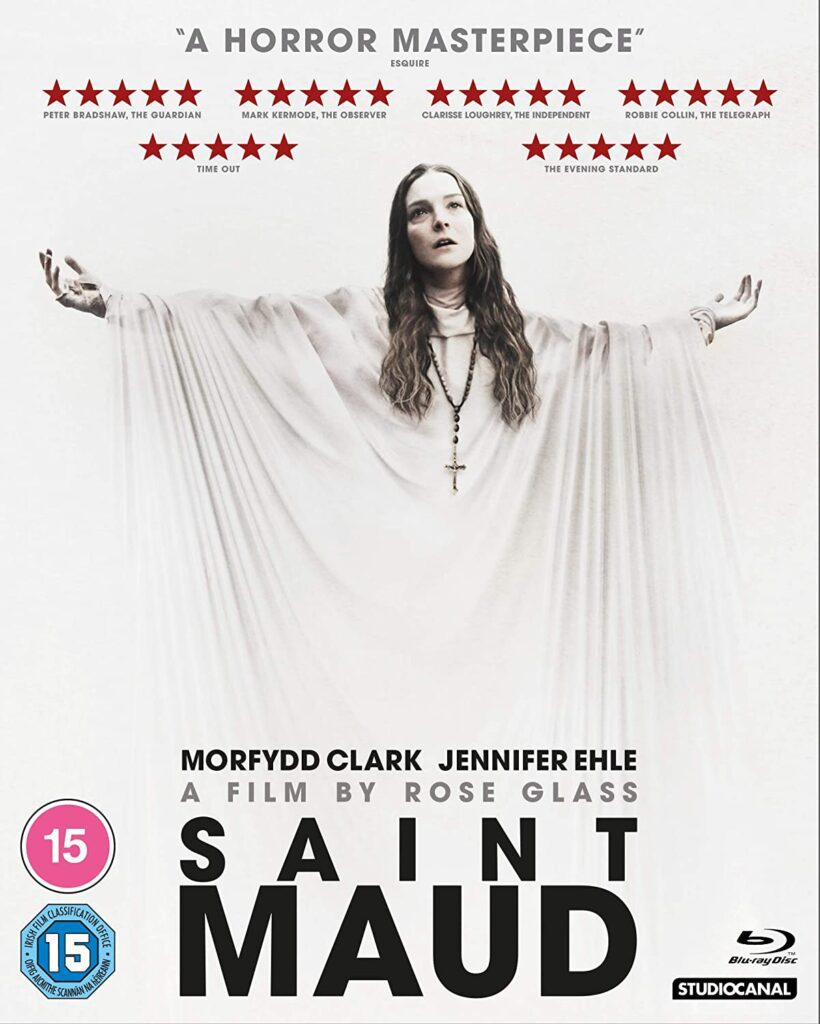
Typically, horror films centering on young women in peril involve them being put in a group that gets picked off one-by-one, leaving them as the last one standing. The final girl who is virginal and must defeat the evil killer or entity. Saint Maud, Rose Glass’ feature directorial debut, is a relieving departure from such tropes as there is no sentient villain. No boogeyman hiding in the shadows or man-made creature. Instead, the young central woman in peril must confront horrors from within.
Our titular heroine (Morfydd Clark) is not a typically wholesome woman antagonized by a villainous masked assailant. She’s a woman seeking to conceal her dark past and tries being a devout Catholic while taking care of Amanda (Jennifer Ehle), a sickly cancer patient whose atheism causes slight tension between the two. As Maud acts as Amanda’s caretaker, we get glimpses of Maud’s apprehensive behavior through the minutiae of her life routine.
For instance, during a scene where Maud is just walking up the stairs, she has an orgasm and starts convulsing on the floor. Maud doesn’t say it, but it’s clear she’s someone who’s in tune with her sex drive. Yet, her sanity slowly gets called into question during the moments where she tries speaking to God, feeling as if he’s having verbal conversations with her. Along with the intricacies in Rose Glass’ writing, lead actress Morfydd Clark does a fine job at mapping out Maud’s gradual unraveling.
Before Saint Maud, Morfydd Clark has been an unsung supporting player in such films as Eternal Beauty, The Personal History of David Copperfield, and even the 2019 creature feature Crawl. But as she stars in a film where she takes center stage, Clark proves herself to be a name that demands one’s attention. Clark is perfectly cast as her welcoming, seraphic face becomes a key tool in burying Maud’s iniquity. In similar terrific form is Jennifer Ehle who provides acerbic comic relief as Amanda, a religious skeptic who takes part in Maud’s religious activities mainly as a way to pass the limited time she has on Earth left.
Additionally, the frenetic cinematography from DP Ben Fordesman reflects Maud’s erratic state of mind. Whether Fordesman follows her with a long take or shows lights flickering on and off in Amanda’s quaint household, he manages to encapsulate Maud’s damaged psyche and also elicit fear more than the use of CGI monsters could. Minus a few visual effects here and there, like a hallucinatory scene involving Maud floating, Saint Maud is all about the mind being the most calculating villain.
Despite its religious themes, Saint Maud is an effective psychological chiller about a woman possessed, but not “possessed” in a traditional religious horror movie sense. With its short screen time at about 84 minutes, along with its minimal effects, Saint Maud is a rather heavenly effort from Rose Glass that proves less can indeed be more.